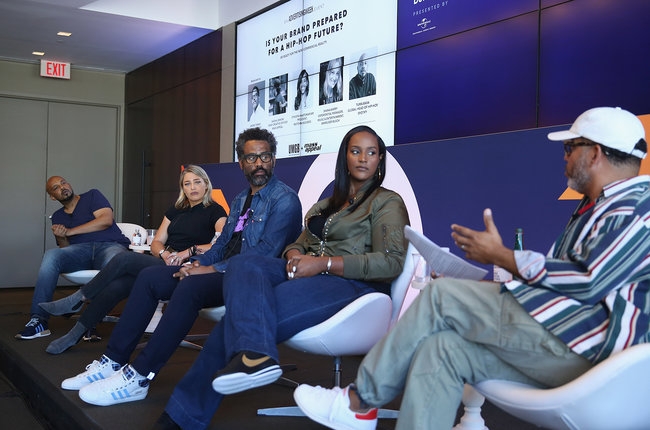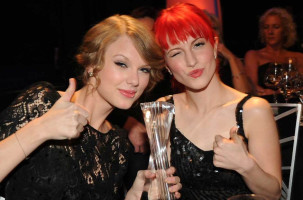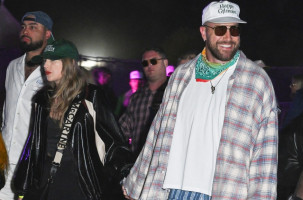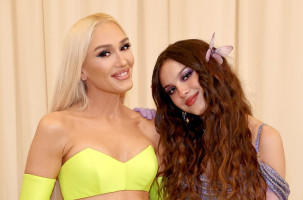“There’s a psychology associated with hip-hop culture that is very brand-friendly. They’re the best brand-building community in the world and also the hardest to reach,” Andre Torres, vp urban music at Universal Music Enterprises, cited from Russell Simmons. “They have the best bullshit meter; you can’t patronize them. If the brands don’t look honest to them, they’ll tear them down.”
Torres spoke as he moderated Universal Music Group & Brands (UMGB) and Mass Appeal’s Is Your Brand Prepared a Hip-Hop Future at Thomson Reuters for New York City’s Ad Week yesterday (Sept. 25). The sentiment by the hip-hop veteran -- who made major strides in early branding with Def Jam Records -- rang true for the room of professionals from music and Madison Avenue.
“If you look at everyone’s footwear on the stage, everyone has really nice footwear,” joked Sacha Jenkins, chief creative officer at Mass Appeal. Jenkins summed up why brands and hip-hop, stemming from the days of Run-D.M.C. and Adidas, have been a match made in heaven: “Hip-hop isn’t just music -- it’s a lifestyle. It’s a culture. That’s why it’s brand-friendly. Hip-hop is the most relevant form of music right now.”
Earlier this summer, Nielsen reported that hip-hop/R&B is the most-consumed and dominant genre of music for the first time since the company began tracking the U.S. music industry, surpassing rock with 25.1 percent of total consumption. From artists-turned-moguls like Diddy and Jay-Z to ascendants like Lil Yachty and Migosbrokering deals with established companies like Nautica and Reebok, respectively, hip-hop is big business -- and record labels are often involved in putting those deals together.
“The [branding] relationship really came from us learning about our artists’ interests,” explained Ethiopia Habtemariam, president of urban music/co-head of creative at Universal Music Publishing Group and president of Motown Records. “When [Yachty] spent time with our brand team, he really laid it out for them. He even brought clothes from his wardrobe and said, ‘I want to be in fashion placements and these are brands that I love.'” Her team then went out to pitch brands based upon the “One Night” rapper’s ideas and interests in order to “connect those dots.”
Yachty had secured additional corporate partnerships with Target, where he and pop favorite Carly Rae Jepsen covered the 1980s rap classic “It Takes Two,” as well as a commercial with Sprite that also featured LeBron James. He mused about this success, while still a relatively new artist, with Genius: “Nautica, Sprite, Target, some other stuff I got coming, I can’t be upset,” he said, reflecting on the way he’s been able to diversify his career beyond music. “It’s too simple, man: Just keep a good image, that’s all I say. Keep a clean image and doors open up.”
Ideally, it’s a synergistic relationship for both rapper and brand. As the gatekeepers of “cool,” rappers offer brands unique and exciting positioning opportunities and can open them up to new consumer bases. “In many ways, [Yachty’s] helped educate the brand,” Habtemariam says of her artist. If a brand doesn’t want a rap cosign -- as has been seen with luxury brands including Cristal -- Jenkins argued that it’ll happen regardless. “You don’t want a rapper buying your stuff? They’re gonna wear it and make it cool anyway.” He pointed to the recent partnership between old school sartorialist Dapper Dan and Gucci. The former bootlegged the latter for years, but the Italian fashion house finally saw an organic way to work together -- getting a major nod from hip-hop purists -- while, presumably, making a lot of money.
Anyone can force a brand deal, as influencer marketing reaches a fevered pitch. However, hip-hop still prides itself as a genre that denigrates imitation and artificiality, so it’s imperative that brand partnerships be rooted in some level of authenticity. Shana Barry, experiential manager of music and entertainment at Anheuser-Busch InBev, has worked on one of the largest-scale hip-hop partnerships through Jay Z’s annual Made in America Festival. Recently, the brand launched activations with Lady Gaga and G-Eazy.
“We don’t do partnerships that we don’t believe in,” Barry said. “For us, it’s really a point to see the bullshit meter. Fans can see through anything. We want artists to tell us, ‘This is what I see in three years, five years.’ We’re all thinking that far these days.” She described Made in America as the “perfect relationship” because there’s a “mutual admiration” between the iconic heritage brand and an iconic artist.
The real challenge will be for brands to incorporate hip-hop aficionados and experts into their strategy -- speak with them, not to them. Spotify's global head of hip-hop Tuma Basa underscored the need for brands and ad agencies to invest in diversity, hiring people who are actually embedded in hip-hop culture and to cultivate them professionally. Otherwise, he said, brands run the risk of being tone deaf or suffering from insular thinking.
Whether brands love hip-hop or not, Jenkins argued that the predominant youth culture is here to stay. “The success of hip-hop proves that whether you want this or not, we’re gonna take what you have,” he said. "We’re gonna wear it and make it special whether you want us or not. Brands are savvy enough to understand, 'Wow, these young folks have a lot of power.'”








